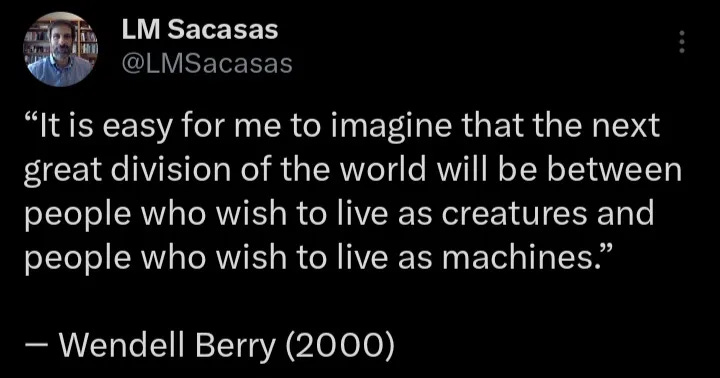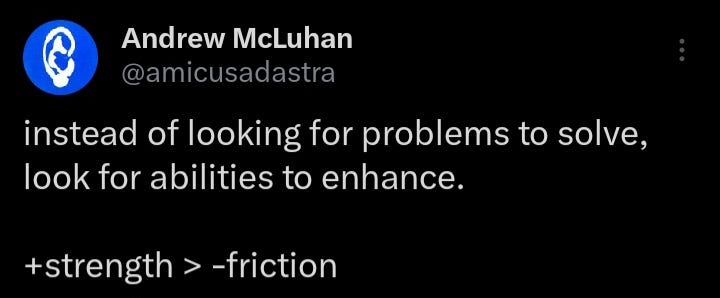Start a Substack!
A 'channeled' message for readers seeking shelter in the wilderness of the kleptocratic attention economy

When I started writing this post, I didn’t think I could distill its central message to three words. Obviously, I underestimated the muses accompanying me on a recent walk.
Unbidden, the three words lit up in my mind:
“Start a Substack!”
That would be my entire message for this post. The rest would be commentary.
I assume most readers recognize the voice of the chief muse responsible for this message. I’m always happy to continue the M2D tradition of channeling Hillel the Elder by conveying messages concisely enough for readers and listeners to consume while standing on one foot.
Especially since the launch of Substack Notes, I marvel at the gems of insight this genre produces. Here's a recent example:
Notice the blend of elegance and practicality. This genre can save readers thousands of dollars while requiring only enough of their attention to read a single sentence. This is impressive ROI!
If we inhabited a rational economic order, VCs would be lining up to invest in Substack publishers hospitable to Hillel's sensibilities. Sadly, one shouldn't look either for rationality or order in the media ecology or attention economy. The reality is that we inhabit an age of economic nihilism.
For me, Substack has been a form of self-defense against the arid wind of nihilism blowing through our media, and I convey the central message of this post enthusiastically for very practical reasons: It's much easier to communicate within Substack, where Elon Musk isn't penalizing my links.
For readers with active Substacks, there’s no need (but it's an option) to read the rest of this post — the “commentary”. Similarly, no need to read further for folks not yet active on Substack but already in agreement with, or persuaded, by my message; good luck with your work and stay in touch!
Now, to readers not yet on Substack by choice, I offer my answer to three questions:
Why Substack?
What's wrong with advertising?
What’s wrong with censorship?
Why Substack?
I think of Substack as a path to recovery from exposure to a media ecology more polluted than our physical environment. The main pollutant is advertising,1 and the main reason to join Substack is that there's no advertising here. The second-most important reason is that Substack doesn't function as a self-appointed censor.
For these reasons, Substack is simply a healthier alternative. Compared to advertising-driven media clinging to content moderation, Substack is neither blind to the problems nor committed to the pseudo-solutions that the tech industry and its regulators pretend to understand and continue to perpetuate.
On Substack, creators and consumers get to negotiate the ways in which they support each other. Here, attention isn’t stolen; it’s earned. Still, when I describe Substack as a “healthier alternative”, I don't mean that it's healthy. Substack, too, has problems. I'm not talking about the pseudo-problem smeared on Substack recently. I mean real problems. In my experience, they're mainly technical problems combined with inadequate technical support.
For example, there are days when the app crashes and glitches relentlessly, and it takes days of working with tech support by email to implement a specific fix that doesn’t even address the root of the problem.
As a result, I often feel frustrated with Substack, but I don’t feel betrayed, offended, outraged, disgusted or manipulated. Substack also offers me a path to income that doesn't cause me to cringe as I often do when scrolling through LinkedIn.
In many ways, Substack sucks, but even if the frequency and severity of its technical issues doubled, Substack would still be qualitatively better than the platforms still defiantly wallowing in willful blindness. These platforms will continue to deny both the dangers of exposure to modern advertising and the absurdity of content moderation. So, I think of Substack as the post-denial choice.
Sure, there's an alternative to Substack and other ad-free and censorship-free media. The alternative is simple. It only requires us to expose our human connections and the fruits of our creative work to platforms accountable mainly to the rapacious appetite of the esteemed Advertiser and the tyranny of reigning ideologies.
To me, this is an easy choice. I choose freedom!
[Insert patriotic music here.]
What’s Wrong With Advertising?
Until very recently, I couldn’t have answered this question without quoting either McLuhan, Bernays, Lippmann, or Gossage or one of the living advocates of ‘humane media’. I'll come back to McLuhan below, and I look forward to revisiting Bernays, Lippmann and Gossage and the living advocates. But in this post, I begin my answer by quoting New York City Mayor Eric Adams.
Advertising is an environmental toxin produced by a vast military operation.
Mayor Adams recently declared social media an “environmental toxin”, making NYC the first city to acknowledge this threat to public health.
The announcement was heralded as big news.
To be fair, Adams indicted “social media”, not “advertising”, but let's set aside nomenclatural issues. The bigger issue is that the Mayor may be bringing a sharply worded statement to oppose what Marshall McLuhan regarded as “a major military operation intended to conquer the human spirit.”
In the “final phase of the extensions of man”, we can hold this truth to be self-evident. So, sure, I give the Mayor credit for the formal acknowledgement of the “environmental toxin”, but let's not rush prematurely toward a resolution of the plot. This ain't it.
Decades ago, McLuhan wrote:
We don't understand information movement and image-making as warfare at all. We call this advertising. Actually, Madison Avenue is a major military operation — vastly aggressive and out to conquer empires, territories within the human art, the human senses. It is a huge military operation of empire-building and icon-making. If we had the slightest consciousness of social responsibility, instead of a private subconscious totally inadequate to our technology, we would teach our children in schools how to protect themselves from media fallout and advertising fallout.
It is simply fantastic the unconsciousness of our western world with regard to the forces that we release upon it. The little areas in which we permit ourselves any consciousness or responsibility are minute compared to the real areas of impact. Advertising is a vast military operation intended openly and advisedly intended to conquer the human spirit. The critics of advertising miss the bus entirely by complaining about false claims. Nothing could be less important than the false claims of advertising. It is the total icon-making activity that matters. (Source: CKLN Tapes)
As Cameron McEwen points out, McLuhan made these comments in the 1970s, the last decade of his life. But even in 1938, in one of his first published papers, McLuhan wrote:
What sort of motive, what complexion of intelligence is likely to be concerned with the output and control of Little Men? For almost a century now, the intelligence of the ablest men has been systematically bought and set to work to exploit the weakness and stupidity of the rest of mankind. This is the exact reverse of the traditional procedure of all civilizations. Hitherto the ablest men have been selected to govern, to educate, rather than to exploit, the others.
In the late 1940s, in the ‘preface’ to The Mechanical Bride, McLuhan wrote:
Ours is the first age in which many thousands of the best-trained individual minds have made it a full-time business to get inside the collective public mind. To get inside in order to manipulate, exploit, control is the object now. And to generate heat not light is the intention. To keep everybody in the helpless state engendered by prolonged mental rutting is the effect of many ads and much entertainment alike. Since so many minds are engaged in bringing about this condition of public helplessness, and since these programs of commercial education are so much more expensive and influential than the relatively puny offerings sponsored by schools and colleges, it seemed fitting to devise a method for reversing the process.
And again from 1953 in ‘The Age of Advertising’, McLuhan described advertising as a form of magic.
The ads are a form of magic which has come to dominate a new civilization.
In his observations, McLuhan often stands alone, but on this subject, his view harmonized well with some of the most influential practitioners of this magical art (e.g., Edward Bernays, Walter Lippmann). The whole story is an open secret.
If the Hungry Ghosts of advertising ever found themselves on the couch with Sigmund Freud, I imagine that he would delight at the opportunity to add these case studies to his files on obsessional neurosis. But in the age of viral media, advertising defines normalcy and good taste. It weaponizes sanity and insanity alike.
This military operation is hard to resist because, if the Hungry Ghosts pose a clear and present danger to public health, they generally do so without even breaking the law. They are super-spreaders of Toxic Memes, but in a system of perverse incentives that rewards them for their amoral relentlessness, they have no reason to stop polluting our media and stealing our attention.
We must be equally relentless in our self-defense. But the reality is that billions of people haven’t even deleted their Facebook accounts. They haven't created Substacks or Medium blogs. Without such deletions and alternative creations, what else can serve as a tabernacle during our passage through the wilderness of the kleptocratic attention economy?
What’s Wrong With Censorship?
Enough about advertising. The second-most important reason to start a Substack is that the corporate owner of this platform doesn't function as a self-appointed censor. By contrast, advertising-based media enact “content moderation”, a form of censorship that fuels the firestorms of selective outrage weaponized by the Left and the Right.
To me, it sounds like the management team “gets it”:
Let Substack publishers earn the attention of consumers. Let them name their problems, remedies and prices. Let them negotiate the rules of engagement.
The attention economy is a problem.
In creating alternatives, err on the side of freedom.
Let people choose whom to trust.
Free press and free speech cannot be decoupled.
Incentive structures are the ultimate expression of Substack's views.
I see censors as examples of the ‘blind gropers’ I introduced in Diagnosis Impossible: Learning to See the Problem. The basic problem with censors is that they know not what they do.
Bonus Content
1. The Next Great Division
on X quotes Wendell Berry on “the next great division”.It is easy for me to imagine that the next great division of the world will be between people who wish to live as creatures and people who wish to live as machines.
2. Conversion Experiences
on X offers an etymological perspective on conversion experiences:Discussions of conversion experience—transformations in one's being, way of life, religious orientation, etc.—often emphasize the "turning motion" (conversio), emphasizing the action "to turn" (vertere).
The language of "turning around" isn't incidentally related to moments of conversion. It's central to them. You were pointed in one direction, and now another.
You've turned around to another point of view.
But lately I've come to think that the prefix "con-" (com), meaning "with" or "together" is underrepresented in these discussions.
Conversion is not exactly self-transformation, as if the the self undergoing metamorphosis is an isolated entity, engaged in an individualistic pursuit of change.
As the name implies, the turning is always con-vertare, "turning with, or together." The togetherness of the turning can point to many things—perhaps specific friends, communities, God, the Good, places, or times.
In short, turning is always turning with, turning together, and this is as essential as the movement itself.
3. What to Do?
on X offers good advice to minds afflicted with the question “What to do?”Instead of looking for problems to solve, look for abilities to enhance. An increase in strength is more valuable than a decrease in friction.
4. Better Problems
On
, in an exploration of the path to Better Problems, I quoted Carl Jung:We don't so much solve our problems as we outgrow them. We add capacities and experiences that eventually make us bigger than the problems.
5. Labatutian Times
I finished reading Benjamin Labatut's When We Cease to Understand the World, but I intend to take ample time to process this material before I write anything about it. In the meantime, I offer you this brilliant essay by Venkatesh Rao.
6. PSA
Finally, here's Current Affairs report on How the Life Coaching Industry Sells Pseudo-Solutions to Our Deepest Problems. At some point this year, I'd like to write a DaaS post on why critics of the industry can't see the full dimensions of this fraud. When I started DaaS, I thought I would be offering people, in part, an alternative to “life coaching”. My message to anyone considering this path was that they should consider DaaS instead.
Now I realize that I may not have a message for anyone considering life coaching. Instead, I direct my message to survivors of the industry determined never to consume this snake oil again.
Housekeeping
First, I'd like to welcome new subscribers who discovered M2D in the new year. I'm thrilled to have you here, and if you're wondering where to begin, I typically suggest Diagnosis Impossible: Learning to See the Problem (now without a paywall).
Second, I like to practice what I preach. Over the past year, I didn't just “Start a Substack”; I created five Substacks, including M2D. As tabernacles in the wilderness, Substacks require consistent care and attention, and I'm currently focused on:
Attracting paying subscribers to Dialogue as a Service (DaaS).
Articulating my Jewish response to fractal falsehood through BS"D.
Continuing my reading of Understanding Media through MISM.
Developing a private Substack at EoT.
Most of what I publish on these Substacks for the foreseeable future will be free, even on DaaS, and free subscriptions are always welcome.
Speaking of practicing what we preach, here are my latest thoughts on the subject.
More precisely, the main pollutant is the entire system of perverse incentives that perpetuates the kleptocratic allocation of human attention. However, in this post, I just don’t want to get hung up on the nomenclature and taxonomy of our environmental toxins. I just want people to start Substacks.







